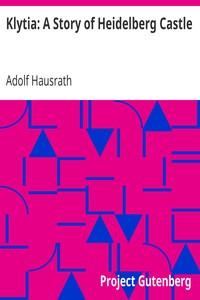Read this ebook for free! No credit card needed, absolutely nothing to pay.
Words: 109512 in 36 pages
This is an ebook sharing website. You can read the uploaded ebooks for free here. No credit cards needed, nothing to pay. If you want to own a digital copy of the ebook, or want to read offline with your favorite ebook-reader, then you can choose to buy and download the ebook.


: Klytia: A Story of Heidelberg Castle by Hausrath Adolf Corkran Sutton Fraser Translator - Heidelberger Schloss (Heidelberg Germany) Fiction
BLOOD AND SAND
A Novel
VICENTE BLASCO IB??EZ
All Rights Reserved
Printed in the United States of America
BLASCO IB??EZ AND "SANGRE Y ARENA"
In the bulk of the noted Spaniard's books there is waged, on both a large scale and a small, the ceaseless, implacable struggle of the new against the old. This eternal battle early formed an appreciable part of even the writer's short fiction. His old seamen look with scorn upon the steam-vessels that replace their beloved barks; his vintners regret the passing of the good old days when sherry sold high and had not yet been ousted from the market by cheap, new-fangled concoctions; his toilers begin to rebel against ecclesiastical authority; some of his heroes are even capable of falling in love with Jewesses or with women below their station ; everywhere is the fermentation of transition. His protagonists,--red-blooded, vigorous, determined,--usually fail at the end, but if there are victories that spell failure, so are there failures that spell victory. It is the clash of these ancient and modern forces that strikes the spark which ignites the author's passion. He is with the new and of it, yet rises above blind partisanship. His dominant figures, chiefly men, are representative of the Spain of to-morrow; not that ma?ana which has so long been a standing reproach to Iberian procrastination, but a to-morrow of rebirth, of rededication to lofty ideals and glowing realities.
His process, like his plot, is simple; whether attacking the Church or the evils of drink, or the bloodlust of the bull ring, his methods are usually the same. He provides a protagonist who shall serve as the vehicle or symbol of his ideas, surrounding him with minor personages intended to serve as a foil or as a prop. He fills in the background with all the wealth of descriptive and coloring powers at his command--and these powers are as highly developed in Ib??ez, I believe, as in any living writer. The beauty of Blasco Ib??ez's descriptions--a beauty by no means confined to the pictures he summons to the mind--is that, at their best, they rise to interpretation. He not only brings before the eye a vivid image, but communicates to the spirit an intellectual reaction. Here he is the master who penetrates beyond the exterior into the inner significance; the reader is carried into the swirl of the action itself, for the magic of the author's pen imparts a sense of palpitant actuality; you are yourself a soldier at the Marne, you fairly drown with Ulises in his beloved Mediterranean, you defend the besieged city of Saguntum, you pant with the swordsman in the bloody arena. This gift of imparting actuality to his scenes is but another evidence of the Spaniard's dynamic personality; he lives his actions so thoroughly that we live them with him; his gift of second sight gives us to see beyond amphitheatres of blood and sand into national character, beyond a village struggle into the vexed problem of land, labor and property. Against this type of background develops the characteristic Ib??ez plot, by no means lacking intimate interest, yet beginning somewhat slowly and gathering the irresistible momentum of a powerful body.
But neither his powers nor his fame can last forever. The life of even Juan Gallardo is taken into his hands every time he steps into the ring to face the wild bulls; at first comes a minor accident, then a loss of prestige, and at last the fatal day upon which he is carried out of the arena, dead. He dies a victim of his own glory, a sacrifice upon the altar of national blood-lust. That Do?a Sol who lures him from his wife and home is, in her capricious, fascinating, baffling way, almost a symbol of the fickle bull-fight audience, now hymning the praises of a favorite, now sneering him off the scene of his former triumphs.
The tale is more than a colorful, absorbing story of love and struggle. It is a stinging indictment brought against the author's countrymen, thrown in their faces with dauntless acrimony. He shows us the glory of the arena,--the movement, the color, the mastery of the skilled performers,--and he reveals, too, the sickening other side. In successive pictures he mirrors the thousands that flock to the bull fights, reaching a tremendous climax in the closing words of the tale. The popular hero has just been gored to death, but the crowd, knowing that the spectacle is less than half over, sets up yells for the continuance of the performance. In the bellowing of the mob Blasco Ib??ez divines the howl of the real and only animals. Not the sacrificial bulls, but the howling, bloodthirsty assembly is the genuine beast!
The volume is rich in significant detail, both as regards the master's peculiar powers and his views as expressed in other words. Once again we meet the author's determination to be just to all concerned. Through Dr. Ruiz, for example, a medical enthusiast over tauromachy, we receive what amounts to a lecture upon the evolution of the brutal sport. He looks upon bull-fighting as the historical substitute for the Inquisition, which was in itself a great national festival. He is ready to admit, too, that the bull fight is a barbarous institution, but calls to your attention that it is by no means the only one in the world. In the turning of the people to violent, savage forms of amusement he beholds a universal ailment. And when Dr. Ruiz expresses his disgust at seeing foreigners turn eyes of contempt upon Spain because of the bull-fight, he no doubt speaks for Blasco Ib??ez. The enthusiastic physician points out that horse-racing is more cruel than bull-fighting, and kills many more men; that the spectacle of fox-hunting with trained dogs is hardly a sight for civilized onlookers; that there is more than one modern game out of which the participants emerge with broken legs, fractured skulls, flattened noses and what not; and how about the duel, often fought with only an unhealthy desire for publicity as the genuine cause?
Thus, through the Doctor, the Spaniard states the other side of the case, saying, in effect, to the foreign reader, "Yes, I am upbraiding my countrymen for the national vice that they are pleased to call a sport. That is my right as a Spaniard who loves his country and as a human being who loves his race. But do not forget that you have institutions little less barbarous, and before you grow too excited in your desire to remove the mote from our eye, see to it that you remove your own, for it is there."
Free books android app tbrJar TBR JAR Read Free books online gutenberg
More posts by @FreeBooks

: Sur les Principes Fondamentaux de la Théorie des Nombres et de la Géométrie by Laurent H Hermann - Number theory; Hyperspace; Geometry Analytic Mathematics; FR Sciences et Techniques








